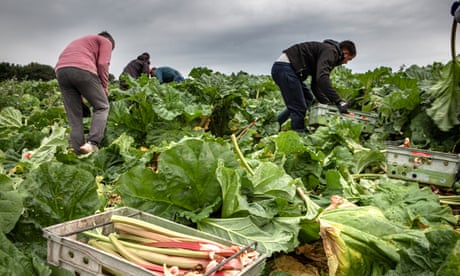But testimonies from migrant workers hired through the scheme sound uncomfortably like those I have heard countless times in the Gulf.
A Ukrainian employed on a British farm said she was forced to cover the costs of her own recruitment and duped into signing a contract she didn’t fully understand. When workers staged a protest, they were punished by being suspended for a week.
A government review of the pilot year of the scheme published late last year found workers subjected to “unacceptable” conditions, including racist abuse, accommodation without running water and contracts not in their own language.
The scheme requires workers to pay for their own flights and visas, in breach of International Labour Organization guidelines, which state that the employer should pay all fees and related recruitment costs. Add to these payments the illegal recruitment fees some workers allege they have been charged, and it is clear that many are arriving in this country deep in debt.
The cost of the visa, flights and fees incurred by one Nepali worker amounted to almost a third of what she earned during her six months on a farm. And, just as in the Gulf, there is no sign that any of the Nepali migrant workers who were forced to pay to secure jobs on UK farms will be compensated.
The parallels with working conditions in the Gulf extend beyond the agricultural sector. A recent report by the University of Nottingham Rights Lab found non-European migrant fishers working on UK-flagged fishing vessels being paid on average £3.50 an hour (after their recruitment debt had been accounted for). A majority reported working a minimum of 16 hours a shift, and over a third said they “experienced regular physical violence”.
The most criticised labour practice in the Gulf has been the kafala system, under which workers are unable to leave their jobs without their employer’s permission, leaving them open to gross exploitation.
Similar practices can be found in the UK. In March the Guardian revealed that some foreign nurses working for NHS trusts and private care homes were being forced to pay thousands of pounds if they wanted to leave, or change jobs, before the end of their contracts, a condition one anti-slavery expert likened to debt bondage.
To be clear, the scale and severity of labour abuses in the UK is still significantly less than in the Gulf. Wages in particular are far better in the UK, where most migrant workers enjoy at least the minimum wage of £9.50 an hour; in Qatar, for example, the minimum wage is the equivalent of just £1 an hour plus food and a dorm bed.

Migrant workers like the Nepalis on our farms are willing to pay the costs – legal and illegal – for the chance to earn UK wages, but in doing so they are effectively subsidising the price of the food in our supermarkets and the healthcare in our hospitals.
The recruitment of foreign workers can benefit both the workers and the UK, but only if the government puts proper safeguards and funding in place. So far, it has done neither. Meanwhile, if you want a foretaste of labour conditions for migrant workers in the UK in the coming years, take a look at Doha and Dubai.
Share your experiences
Have you worked on a UK farm as part of the seasonal worker visa scheme? You
can get in touch by filling in this encrypted form, anonymously if you prefer. Read terms of service here and privacy policy here.
Your responses are secure as the form is encrypted and only the Guardian has access to your contributions.
